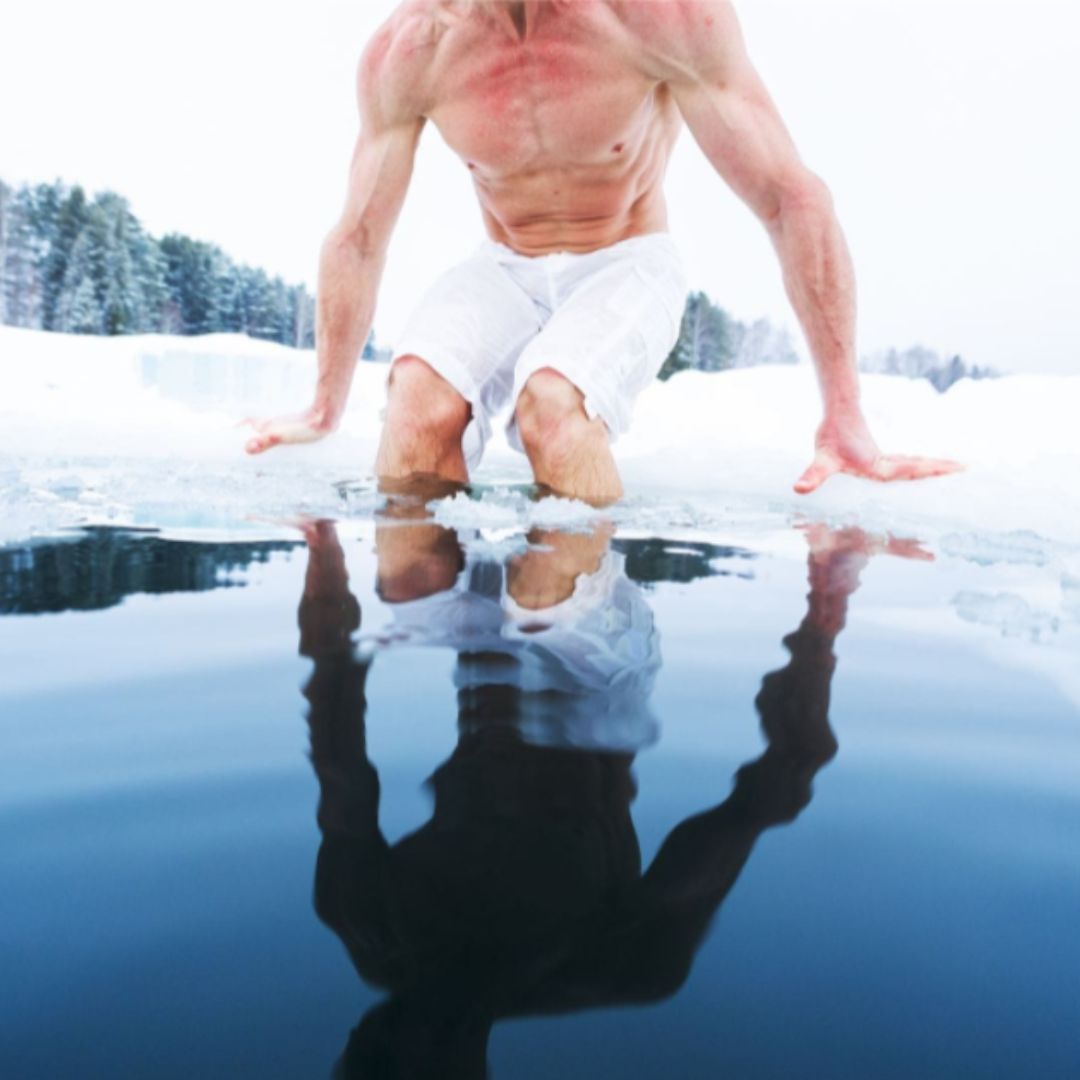In the never-ending quest to improve our health and well-being, various approaches and methods have emerged, but few are as fascinating and promising as the Wim Hof Method . Developed by the famous " Iceman " himself, Wim Hof, this method relies on a unique combination of breathing techniques, meditation and exposure to cold to optimize the potential of the body and mind.
At the heart of the Wim Hof method is a practice well known for its fearless and revitalizing nature: cold baths.
Order your bath via our partner Icepiration, and obtain an immediate 5% discount on your Icepiration bath by clicking here.
Cold baths, or cold water immersion, are an essential part of Wim Hof's daily routine and play a central role in the many physiological and psychological benefits this method offers.
In this article, we will explore in depth the secrets of cold baths and how they fit into the Wim Hof method. We will discover both the physical and mental benefits of this practice, relying on solid scientific research to support our claims. Prepare to dive into a world where cold becomes an ally of health and well-being, and where each immersion offers a multitude of benefits for the body and mind.
The physiological effects of cold baths
Cold baths are not only an invigorating experience; they also have a profound impact on our physiology, including strengthening our immune system, reducing inflammation and improving blood circulation.
Activation of the immune system
One of the most fascinating properties of cold baths is their ability to stimulate our immune system. Scientific studies have demonstrated that exposure to cold triggers a complex biological response, involving the release of certain hormones and the modulation of immune cells.
Specifically, exposure to cold stimulates the production of norepinephrine , a hormone associated with alertness and the stress response. Norepinephrine acts as a signal to mobilize immune cells, such as T cells and natural killer (NK) cells, strengthening our ability to fight infections and pathogens.
Studies have also shown that cold baths can increase the production of anti-inflammatory cytokines, which help regulate the inflammatory response and prevent autoimmune diseases. By stimulating these immune responses, cold baths can therefore help to strengthen our resistance to infections and promote overall health.
Reduction of inflammation
In addition to their effect on the immune system, cold baths are also known for their anti-inflammatory properties. Chronic inflammation is an underlying cause of many diseases, including cardiovascular disease, metabolic disorders, and neurodegenerative conditions.
Research has shown that exposure to cold can reduce the production of pro-inflammatory cytokines, while increasing the activity of anti-inflammatory cytokines. Additionally, cold acts directly on pain receptors, which can relieve chronic pain and symptoms associated with inflammation.
By practicing cold baths regularly, it is possible to maintain lower levels of inflammation in the body, which can have a significant impact on long-term health.
Improved blood circulation
Finally, cold baths have a beneficial effect on blood circulation , which can contribute to better cardiovascular health and faster muscle recovery. When the body is exposed to cold, blood vessels initially constrict in a process called vasoconstriction.
However, this vasoconstriction is followed by vasodilation, in which blood vessels dilate to allow increased flow of blood to the tissues. This process, known as the " cold shock response ," stimulates blood flow and can promote injury healing, reduce muscle soreness, and improve recovery after exercise.
Additionally, exposure to cold can also stimulate the production of adrenaline, a hormone that increases heart rate and the force of contraction of the heart, thereby improving overall blood circulation.
In summary, cold baths are not only an invigorating experience, but they also provide an array of physiological benefits, including strengthening the immune system, reducing inflammation and improving blood circulation. These combined effects make cold baths a powerful tool for promoting long-term health and well-being.

The Mental Benefits of Cold Baths
In addition to their physiological effects, cold baths also provide many mental health benefits, including reducing stress and anxiety, improving mood and concentration, and strengthening mental resilience.
Reduction of stress and anxiety thanks to cold baths
Cold baths are known for their ability to induce a state of calm and relaxation, making them a valuable tool for reducing stress and anxiety. This stress reduction is attributed in part to activation of the parasympathetic nervous system, which is responsible for the body's relaxation response.
Studies have shown that exposure to cold can decrease levels of the stress hormone cortisol while increasing the release of neurotransmitters such as dopamine and serotonin, which are associated with feelings of well-being and happiness. happiness. Additionally, cold baths can promote the release of endorphins, natural pain-relieving hormones that provide a feeling of calm and contentment.
By combining these physiological effects, cold baths can help calm the mind and relieve mental tension, providing effective relief from stress and anxiety.
Improved mood and concentration
Besides their relaxing effect, cold baths can also boost mood and concentration. As we said above, exposure to cold is known to increase the release of norepinephrine and dopamine, two neurotransmitters involved in the regulation of mood and motivation.
Studies have shown that exposure to cold can improve mental alertness, mental clarity, and the ability to concentrate, making it a valuable tool for those looking to stay alert and focused throughout the day.
Additionally, cold baths may also stimulate the production of neurotrophic factors, proteins that promote the growth and survival of neurons, which may have beneficial effects on cognition and long-term brain function.
Building mental resilience
Finally, regular practice of cold baths can strengthen mental resilience, that is, the ability to cope with the stress and challenges of daily life . By regularly exposing ourselves to uncomfortable situations, such as immersion in cold water, we learn to tolerate discomfort and develop a more positive attitude towards challenges.
Additionally, cold baths can teach emotional regulation techniques, such as deep breathing and mental focus, which can be applied in other aspects of life to face stress and adversity with calm and confidence .
In conclusion, cold baths are not only beneficial for the body, but also for the mind, providing a multitude of mental health benefits, including reducing stress and anxiety, improving mood and concentration, as well as strengthening mental resilience. Incorporating cold baths into your daily routine can therefore be a powerful way to promote optimal mental health and overall well-being.
Practical advice for integrating cold baths into your routine
Incorporating cold baths into your daily routine may seem intimidating at first, but with a gradual approach and a few practical tips, it can become a rewarding practice that benefits your health and well-being.
1. Instructions for safe and gradual cold water immersion:
- Start slowly: For beginners, it is recommended to start with short exposures to cold water, such as a cold shower for 30 seconds to a minute.
- Gradually increase duration and intensity: Over time, you can gradually increase the duration and intensity of cold exposure, aiming for complete immersion in a cold bathtub or lake.
- Listen to your body: Listen to your body's signals and don't force things. If you experience excessive discomfort, get out of the water immediately and try again later.
- Finish with warm: After a cold water immersion, warm yourself slowly with a hot shower or by wrapping yourself in a warm towel to promote a smooth transition.
2. Tips to overcome initial apprehension and maintain a regular practice of cold baths:
- Adopt a positive attitude: Approach cold baths with curiosity and an open mind, focusing on the potential benefits to your health and well-being.
- Create a ritual: Integrate cold baths into your daily routine by combining them with other activities, such as meditation or breathing, to make it a pleasant and revitalizing time.
- Find a partner: Find a friend or family member to accompany you on your cold bath journey, to support each other and make the experience more enjoyable.
- Celebrate progress: Reward yourself for each milestone you reach in your cold bathing practice, whether by writing down your accomplishments or treating yourself to some relaxing time after a session.
3. Recommendations for combining cold baths with other aspects of the Wim Hof method:
- Practice Wim Hof breathing: Before or after cold baths, practice the specific breathing techniques of the Wim Hof method to enhance the beneficial effects on health and well-being.
- Meditate after immersion: After a cold water immersion, take a few moments to meditate and connect with your body and mind, focusing on the sensations and benefits felt.
- Experiment with other practices: Explore other aspects of the Wim Hof method, such as exposure to the cold outdoors or walking barefoot in the snow, to enrich your experience and discover new challenges.
By following these practical tips and adopting a gradual approach, cold baths can become an enriching and invigorating part of your daily routine, helping you strengthen your physical and mental health according to the principles of the Wim Hof Method.
Cold baths aren't just a refreshing feeling; they are a powerful tool for optimizing our physical and mental health. Through this article, we have explored in depth the many benefits of cold baths, supported by solid scientific research and the inspiring stories of those who have integrated them into their daily lives.
On a physiological level, cold baths strengthen our immune system, reduce inflammation and improve blood circulation, providing a host of benefits for our overall health. On a mental level, they are an effective tool for reducing stress and anxiety, improving mood and concentration, and building mental resilience in the face of daily life challenges.
By adopting a holistic approach to health and wellness, inspired by the Wim Hof Method, we can incorporate cold baths into our daily routine to cultivate optimal health, both physically and mentally. By combining cold baths with other practices such as breathing and meditation, we can maximize their benefits and explore new dimensions of our human potential.
Finally, I invite you to join the community of practitioners of cold baths and the Wim Hof method, to share your experiences and discoveries, and to continue to enrich our understanding of the extraordinary effects of cold baths on the body and mind. Together we can explore the limits of our human potential and cultivate a life of health, happiness and well-being.


Mastering cold baths with the Wim Hof method: Techniques, Benefits and advice
How to take a cold bath at home? [5 minutes]